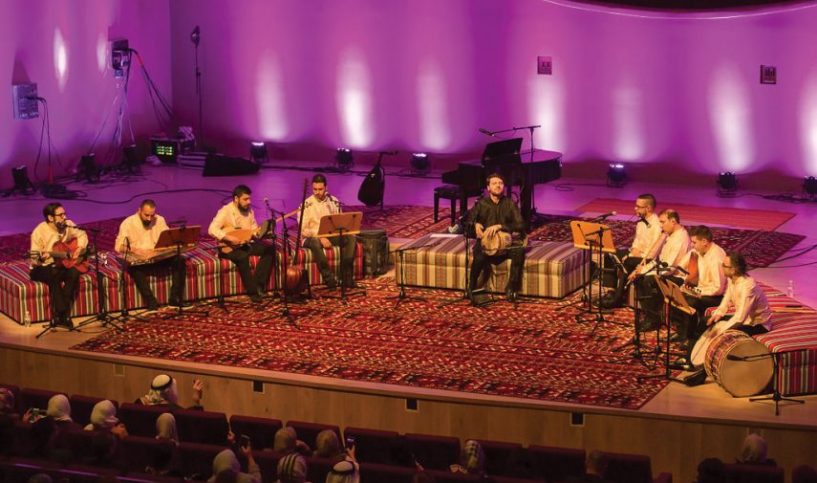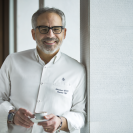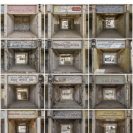Last month, and for one magical night at the Sheikh Jaber Al Ahmad Cultural Center, audiences in Kuwait witnessed the musical stylings of internationally acclaimed artist Sami Yusuf. Titled Barakah, audiences were regaled by a seamless journey of self-discovery and mystery, musically foraying from East to West through the artist’s latest album, Barakah, along with a stunning performance of his greatest hits.
In association with the British Council in Kuwait and the National Council for Culture, Arts and Letters, cultural collaboration is presented at its finest through this concert to provide opportunities for audiences in the UK and Kuwait to experience the culture and creativity of both nations. As part of the “Kuwait Capital of Islamic Culture 2016” initiative, world renowned British musician Sami Yusuf was invited to perform, and we were extremely lucky to sit down with the artist during his short visit to Kuwait.
How did your career develop 15-years-ago?
I come from a musical family, my dad is a composer, and I grew up in a highly cultivated and culturally rich home, where the works of Rumi, Hafez and Shakespeare, amongst many other greats, were constantly discussed. The music we enjoyed was always connected to spirituality, and in growing up in London, I learned how to play several instruments from my father, along with composers from the Royal Academy and got into the business very early on. I began producing music before performing at the age of thirteen.
Was that when you first performed?
Well, we always sang at home as a family before I sang for the first time at a studio. It was daunting, surely, but I felt a rare passion and sincerity, that everything developed organically from there.
What inspires your music?
I’ve always loved the sacred from a very young age. I would say it’s my profound love for the sacred, all that is sacred, and all that stems from the sacred. Our histories, our nations, beautiful faces and people, different backgrounds led me to believe that ultimately there is a sacred in all of us—this is what inspires me.
How did your music evolve throughout the years?
There has been an intellectual and spiritual evolution since I began my career. My first album, Al-Mu’allim, that was released in 2003 arrived as a devotional piece of work, and it was record breaking. This provided me with a meteoric rise to fame that I didn’t really want at the time, if I’m being honest. After my second album, My Ummah, that discussed social and political issues and the Palestinian plight along with peoples’ freedoms, I felt quite disillusioned by the fame and therefore I took a five year break for contemplation and introspection— I needed to study what I am doing this for.
It was a healthy break, and I came back musically revived. It allowed me to delve deeper inwardly and the result was the album Wherever You Are, which came out in 2010 with songs like “Healing”. Thinking of that, healing is an act of kindness, that in and of itself, is charity as music elevates our daily interactions. Music is healing, and the Ottomans back in the day utilized music for its therapeutic qualities that are attributed to the practices of music therapy today in modern culture.
I also worked towards raising awareness for various causes, and presented “Forgotten Promises” alongside the UN World Food Program to help feed the world’s most impoverished populations. Then came my first overtly spiritual Sufi album, The Center, which was truly an ode to the mystic relics of days past, and after that, I spent my time researching my latest work—Barakah.
What should audiences expect from Barakah?
I consider Barakah to be the most important work that I’ve done today.
[Yusuf laughs and points to album cover] First, I had a beautiful, traditional, Moroccan-inspired image on the cover, then the record company asked to change it to put a picture of my face on it- unfortunately. On a more serious note, however, it was to my absolute surprise that this album became a bestseller in the Middle East, and it was number one on the iTunes store in the UK World Music Chart. It is a celebration of 1000 years of spiritually-inspired music— it is not sectarian, it is mainstream. I celebrate traditional music from India to Andalucía, and everything in between.
It must have been a lot of fun to work on.
Fun, and again daunting! The pressure of making it authentic, maintaining this authenticity while keeping it all minimalistic. It took me a year of research at least, from Cambridge in the UK to Harvard—it was a great undertaking.
Would you say that Barakah is an educational, as well as an uplifting album?
I believe so. I also think that it’s a reminder of our tradition. It’s important to celebrate success, but at the same time it is also important to delve into the past, not as though it is some distant thing, but as a living tradition that is still alive and well in various parts of the world. It’s just not accessible worldwide. We’ve made it accessible to the masses.
Without delving too much into the issue of politics, it is also important to fight today’s extremism with positivity and intellect. The way to deal with that, I felt, is to go back to tradition, understand it, and revive it through musical understanding. Barakah is a celebration of over 1000 years of spiritual music but not only that, it is also a celebration of tradition, culture, and heritage. As a lover of all the religions, I believe that Barakah’s message is universal and it is one that depicts love and understanding.
For more information, please visit Sami Yusuf’s website www.samiyusufofficial.com. Photography by Sam Gribble, S J photography.








